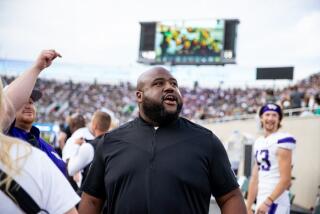John Beilein helps bring fab times back to Michigan basketball
- Share via
On an April morning almost 11 years ago, John Beilein left the Morgantown, W.Va., airport in a Cessna Citation jet with a large block ‘M’ on the tail.
The three-hour flight to Ann Arbor, Mich., completed the coach’s breakneck courtship to leave West Virginia for Michigan.
“One day you’re at the lowest of lows regarding the decisions you have to make and the friends you have to depart from,” Beilein told reporters at the time. “The next day you walk into an environment like this and it’s hard to comprehend.”
Though memories of that day have faded, the impact has not. Beilein revived Michigan’s dormant basketball program, became the winningest coach in school history and has more than 700 career victories. He will lead the third-seeded Wolverines against seventh-seeded Texas A&M on Thursday at Staples Center in the West Regional semifinals.
Before Beilein took over, Michigan hadn’t appeared in the NCAA tournament since 1998. The program sagged under the weight of NCAA sanctions from a scandal involving team booster Ed Martin. Banners from the vacated Final Four appearances in 1992 and 1993 were consigned to storage at Michigan’s Bentley Historical Library. The halcyon days of the Fab Five — the trademark baggy shorts and black socks and trash talk — seemed like memories from another lifetime.
Beilein changed everything, down to practicing with special $46 basketballs he designed to teach proper rotation on jump shots. He looks more like a small-town high school coach with rolled-up sleeves and an ever-present cup of coffee than someone making almost $3 million a year. But the Wolverines have won 245 games in 11 seasons under the coach. That includes eight NCAA tournament appearances and advancing to the national title game in 2013.
It started with a story in Sports Illustrated.
The name of West Virginia star Kevin Pittsnogle caught the eye of Bill Martin, then Michigan’s athletic director, while skimming the magazine in 2005. He became a closet fan of Beilein’s up-tempo offense inspired by former Washington coach Andy Russo. After Martin fired Tommy Amaker two years later after going 109-83 in six seasons, Beilein’s name sat atop the list of 40 candidates compiled by the school’s search committee.
One Michigan administrator repeatedly lobbied Martin via email to hire Beilein (he had been her social studies teacher in seventh grade).
Martin interviewed Beilein and his wife, Kathleen, during a discreet meeting in a hotel conference room in Atlanta during the Final Four.
The folksy, low-key coach who grew up on an apple farm in New York with eight siblings doesn’t have a traditional background.
He has never been an assistant, instead starting as the junior varsity coach at Newfane (N.Y.) High in 1975. He did the team’s laundry and taped players’ ankles before games at Erie Community College in New York. He drove the team van at Le Moyne in Syracuse, N.Y. He added stops at Nazareth, Canisius and Richmond, becoming a specialist at rebuilding programs, before West Virginia.
At one point during the meeting with Martin — they didn’t talk much basketball — Beilein and his wife exchanged a knowing look. Michigan felt right.
Beilein and Martin soon agreed on a six-year contract. The coach expected this to be his last job.
Five days later, the jet left West Virginia at 9:07 a.m.
“It’s a thrilling day for the Beilein family,” Beilein said at his introductory news conference.
The coach upended Michigan’s program. No detail seemed too small.
A big-screen television to review game tape replaced the trophy from Michigan’s National Invitation Tournament championship in 2004 that occupied a prominent place in Amaker’s office.
Michigan players had to meet 15 goals before they were allowed to practice. The tests included running a mile in 5 minutes, 30 seconds or less, and making 50 three-point shots in five minutes.
Beilein implemented a conditioning regimen involving sprinting around the track at Michigan’s Ferry Field — four sets each of 400 meters, 200 meters, 100 meters, then repeat with shorter target times.
“Nobody’s going to be in better shape,” the coach told his players after one early session.
He explained his system to players with a board in his office, moving blue and yellow checkers around to simulate plays.
When practice started, Beilein introduced a new language with terms that included: “aircraft carriers” (when a player’s defensive stance is too low); “banana cuts” (moving too deep when cutting toward the basket); “Nash” (trying a scoop shot like Steve Nash, the former guard for Dallas Mavericks, Phoenix Suns and Lakers).
Beilein didn’t care about a player’s recruiting ranking — he targeted kids who fit his exacting system.
Even the literature in lockers received a makeover. Each player received a laminated sheet of paper with motivational quotes unique to their role.
Almost 11 years later, Michigan is a program made in the Beilein’s image.
“There’s opportunities. There’s challenges. There’s big challenges, but I’ve never looked at the challenges as much as I’ve looked at the opportunities,” the coach said at his first news conference after being hired. “We have one great opportunity here to put the University of Michigan basketball program back on a national stage and be national contenders.”
The words almost seem prophetic.
Twitter: @nathanfenno
More to Read
Go beyond the scoreboard
Get the latest on L.A.'s teams in the daily Sports Report newsletter.
You may occasionally receive promotional content from the Los Angeles Times.











